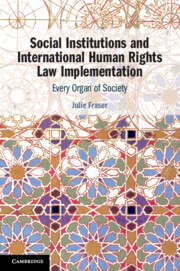Book contents
- Social Institutions and International Human Rights Law Implementation
- Social Institutions and International Human Rights Law Implementation
- Copyright page
- Dedication
- Contents
- Foreword
- Acknowledgements
- 1 Introduction: The Challenge of Human Rights Implementation
- 2 Human Rights and Their Cultural Connection
- 3 Domestic Implementation of International Human Rights Treaties: Legislative and Other Effective Measures
- 4 Domestic Implementation of International Human Rights Treaties: The Role of Public and Private Actors
- 5 Role of Islamic Law and Institutions in Implementing Women’s Right to Family Planning in Indonesia
- 6 Conclusions: Social Institutions and the Future of Domestic Human Rights Implementation
- Select Bibliography
- Index
1 - Introduction: The Challenge of Human Rights Implementation
Published online by Cambridge University Press: 04 September 2020
- Social Institutions and International Human Rights Law Implementation
- Social Institutions and International Human Rights Law Implementation
- Copyright page
- Dedication
- Contents
- Foreword
- Acknowledgements
- 1 Introduction: The Challenge of Human Rights Implementation
- 2 Human Rights and Their Cultural Connection
- 3 Domestic Implementation of International Human Rights Treaties: Legislative and Other Effective Measures
- 4 Domestic Implementation of International Human Rights Treaties: The Role of Public and Private Actors
- 5 Role of Islamic Law and Institutions in Implementing Women’s Right to Family Planning in Indonesia
- 6 Conclusions: Social Institutions and the Future of Domestic Human Rights Implementation
- Select Bibliography
- Index
Summary
The introductory chapter frames the book in the contemporary setting of persistent human rights violations, increasing human rights contestation and shifting global dynamics. The chapter articulates the challenge of human rights implementation, highlighting the gap between international norms and local realities. It identifies several problematic factors in the effective domestic implementation of international human rights law. First, the chapter addresses the long-standing cultural critique of universal human rights, and their continued cultural disconnect in many societies today. It then addresses the state-centric and legalistic nature of human rights as problematic factors in implementation. This first chapter advocates an increased role for other (non-legal) measures and other (non-state) actors in the domestic implementation of human rights in order to overcome the problems identified. Specifically, a greater role for social institutions is advocated. Finally, the first chapter sets out the book’s research design, case study and structure.
Keywords
- Type
- Chapter
- Information
- Social Institutions and International Human Rights Law ImplementationEvery Organ of Society, pp. 1 - 20Publisher: Cambridge University PressPrint publication year: 2020

